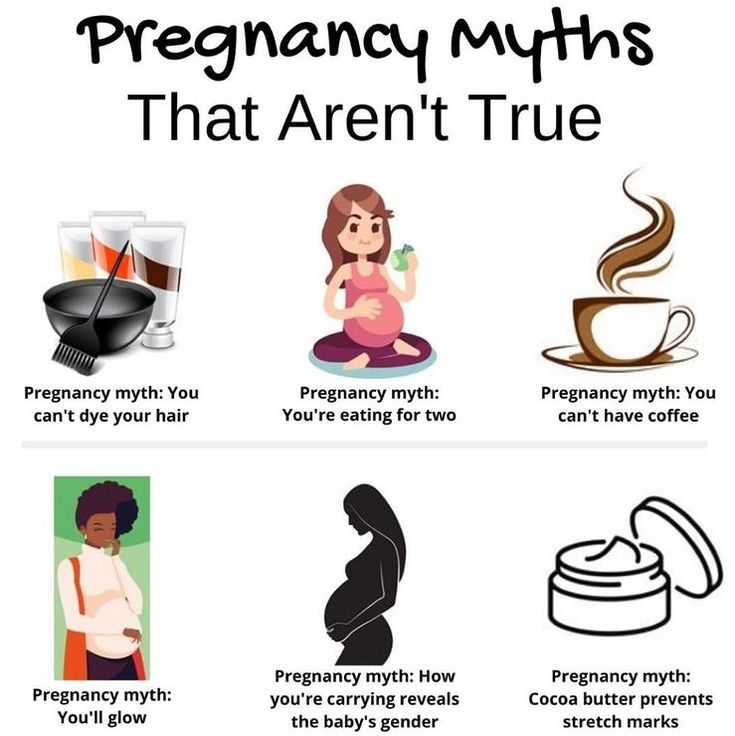Pregnancy myths often mislead expecting parents. Understanding the truth can empower you throughout your journey.
Pregnancy is a beautiful yet complex experience filled with excitement and uncertainty. With so much information available, distinguishing between fact and fiction becomes essential. Many myths can create unnecessary stress or confusion for expectant parents. From dietary restrictions to exercise guidelines, misconceptions can affect decisions.
Addressing these myths is crucial for a healthy pregnancy. Reliable information can help you make informed choices, ensuring both mother and baby thrive. This article will debunk common pregnancy myths and clarify what you really need to know. Prepare to navigate your pregnancy journey with confidence and peace of mind, armed with accurate information to support your experience.

Credit: www.facebook.com
Introduction To Pregnancy Myths
Pregnancy is a beautiful journey. Yet, it comes with many myths. These myths can confuse expectant parents. They often circulate through family and friends. Understanding the truth is crucial for a healthy pregnancy.
The Impact Of Myths On Expectant Parents
Myths can create unnecessary stress. Expectant parents may worry about false information. Here are some common impacts of these myths:
- Increased Anxiety: Parents may fear complications that don’t exist.
- Unrealistic Expectations: Myths can set false standards for pregnancy.
- Health Risks: Some myths may lead to harmful practices.
Education is vital. Expecting parents should seek accurate information. This helps them make informed decisions. It promotes a positive pregnancy experience.
Purpose Of Myth Debunking
Debunking myths is essential for many reasons:
- Promote Accurate Knowledge: Correct information helps parents understand pregnancy.
- Reduce Anxiety: Knowing the truth alleviates unnecessary fears.
- Encourage Healthy Practices: Accurate guidance leads to safer choices.
By addressing these myths, expectant parents gain confidence. They can focus on enjoying their pregnancy journey.
Eating For Two: Nutritional Misconceptions
Pregnancy brings many changes. One common myth is “eating for two.” This phrase often leads to confusion about nutritional needs. Expecting mothers may think they need to double their food intake. This is not true. Understanding actual caloric needs is essential for a healthy pregnancy.
Caloric Needs During Pregnancy
Pregnant women do need more calories. Yet, the increase is not as drastic as many think. Here are the recommended calorie increases:
| Trimester | Additional Calories |
|---|---|
| First Trimester | 0 extra calories |
| Second Trimester | 340 extra calories |
| Third Trimester | 450 extra calories |
Focus on quality, not just quantity. Choosing the right foods is vital.
Balanced Diet Essentials
A balanced diet supports mother and baby. Here are key components of a healthy diet:
- Fruits and Vegetables: Aim for variety and color.
- Whole Grains: Choose oats, brown rice, and whole wheat.
- Protein: Include lean meats, beans, and nuts.
- Dairy: Opt for low-fat or fat-free options.
- Healthy Fats: Include avocados and olive oil.
Stay hydrated. Drink plenty of water every day.
Eat smaller, more frequent meals. This can help with nausea and energy levels.
Exercise And Activity Levels
During pregnancy, many women wonder about safe exercise and activity levels. Exercise is important for health, but myths can create confusion. Understanding what is safe helps in making informed choices.
Safe Exercise Practices
Staying active during pregnancy has many benefits. It can reduce discomfort and boost energy. Here are some safe exercise practices:
- Consult your doctor before starting any exercise program.
- Focus on low-impact activities like walking, swimming, or yoga.
- Listen to your body. Stop if you feel pain or discomfort.
- Stay hydrated. Drink plenty of water during exercise.
- Avoid exercises that involve lying flat on your back after the first trimester.
Myths About Physical Strain
Many myths surround exercise during pregnancy. These can lead to unnecessary fears. Here are some common myths:
| Myth | Fact |
|---|---|
| Pregnant women should avoid all exercise. | Most women can safely exercise with guidance. |
| Exercise harms the baby. | Moderate exercise is safe and beneficial for both. |
| Heavy lifting is always dangerous. | Light to moderate lifting can be safe. |
| All sports should be avoided. | Low-impact sports can be safe. Consult your doctor. |
Understanding these myths helps in making better choices. Always prioritize safety and comfort during any exercise routine.

Credit: torontek.com
Prenatal Health And Gender Predictions
Expecting parents often wonder about their baby’s gender. Many myths surround this topic. Some believe certain signs can predict if it’s a boy or a girl. This section explores these beliefs and the science behind them.
Old Wives’ Tales
Old wives’ tales have shaped gender predictions for centuries. Here are some popular myths:
- Carrying High or Low: A high belly suggests a girl. A low belly indicates a boy.
- Cravings: Craving sweet foods means a girl. Craving salty means a boy.
- Heartbeat Rate: A girl has a faster heartbeat than a boy.
- Skin and Beauty: Dull skin means a girl. Glowing skin means a boy.
These tales are fun but lack scientific backing. They rely on anecdotal evidence rather than facts.
Scientific Truths Behind Gender Guesses
Science offers clearer insights into gender prediction. Here are some methods:
| Method | Accuracy | Notes |
|---|---|---|
| Ultrasound | 95%+ | Most accurate after 18 weeks. |
| Genetic Testing | 99% | Involves blood tests, very reliable. |
| Chinese Gender Chart | 50% | Based on lunar age and month of conception. |
While some methods are scientifically sound, others are not. Expecting parents should approach gender predictions with caution.
Understanding prenatal health is essential. Focus on a healthy pregnancy for the best outcomes.
Fish Consumption And Mercury Concerns
Pregnancy brings many dietary questions, especially about fish. Some fish contain mercury, which can harm development. Pregnant women should be careful about the types of fish they eat. Understanding fish consumption and mercury concerns is essential for a healthy pregnancy.
Types Of Fish To Avoid
Some fish have high mercury levels. Pregnant women should avoid these types:
- Shark
- Swordfish
- Kingly Mackerel
- Tilefish
These fish can cause serious health issues for the baby. Always check local advisories for fish caught in your area.
Benefits Of Omega-3s
Fish is a great source of Omega-3 fatty acids. These fats support brain development in babies. They also help reduce pregnancy complications. Safe fish options include:
| Type of Fish | Omega-3 Content |
|---|---|
| Salmon | High |
| Sardines | High |
| Trout | Moderate |
| Anchovies | High |
Eating these types of fish can boost your health. Aim for two servings per week. Check with your doctor for personalized advice.
The Coffee Debate: Caffeine During Pregnancy
Many expectant mothers question caffeine’s safety. Coffee, tea, and soft drinks contain caffeine. Concerns about caffeine’s effects on pregnancy are common. Understanding the risks and guidelines helps make informed choices.
Risks Of Caffeine
Caffeine can affect pregnancy in several ways:
- Miscarriage: High caffeine intake may increase miscarriage risk.
- Low Birth Weight: Babies may weigh less at birth.
- Preterm Birth: Caffeine may lead to early delivery.
- Developmental Issues: It may impact fetal brain development.
Moderation is key. Excess caffeine can lead to complications. Always consult a healthcare provider for personalized advice.
Acceptable Caffeine Intake
Experts recommend limiting caffeine during pregnancy. Here are some guidelines:
| Caffeine Source | Caffeine Content (Approximate) |
|---|---|
| Coffee (8 oz) | 95 mg |
| Tea (8 oz) | 47 mg |
| Soft Drinks (12 oz) | 30-40 mg |
| Energy Drinks (8 oz) | 80 mg |
Most guidelines suggest limiting caffeine to 200 mg per day. This is about one 12-ounce cup of coffee. Always consider all sources of caffeine in your diet.
Hair Coloring And Cosmetic Use
Pregnancy brings many changes. Expecting mothers often worry about beauty routines. Questions arise about hair coloring and cosmetic use. Are these safe during pregnancy? Let’s explore common myths and safe practices.
Chemical Exposure Myths
Many myths surround chemical exposure in beauty products. Here are some common beliefs:
- Myth 1: Hair dye causes birth defects.
- Myth 2: Cosmetics lead to pregnancy complications.
- Myth 3: All chemicals are harmful during pregnancy.
Research shows most hair dyes are safe. Studies indicate low chemical absorption. Risks are minimal, especially for modern products. Pregnant women should still be cautious.
Safe Beauty Practices
Choosing safe beauty practices is essential. Here are tips for pregnant women:
- Use natural hair dyes. They have fewer chemicals.
- Apply hair color in a well-ventilated area.
- Avoid coloring hair during the first trimester.
- Choose hypoallergenic cosmetics. They reduce allergy risks.
- Check labels for phthalates and parabens.
Always consult a healthcare provider before using new products. Keeping beauty routines safe ensures a healthy pregnancy.
The Role Of Stress On Pregnancy
Pregnancy is a beautiful journey. However, it can bring stress. Understanding how stress affects pregnancy is crucial. This section explores common myths and ways to manage stress effectively.
Stress-related Myths
Many myths surround stress and pregnancy. Here are some common misconceptions:
- Myth 1: Stress always harms the baby.
- Myth 2: Pregnant women should avoid all stress.
- Myth 3: Only major stress impacts pregnancy.
It’s important to understand the truth behind these myths:
| Myth | Truth |
|---|---|
| Stress always harms the baby. | Some stress is normal and can even be helpful. |
| Pregnant women should avoid all stress. | Managing stress is key, not avoiding it completely. |
| Only major stress impacts pregnancy. | Even small stressors can affect emotional well-being. |
Managing Stress Effectively
Managing stress during pregnancy is vital. Here are some effective techniques:
- Deep Breathing: Helps calm the mind and body.
- Exercise: Light activities like walking improve mood.
- Talk to Someone: Sharing feelings reduces stress.
- Mindfulness: Focus on the present moment to relax.
- Sleep Well: Adequate rest supports mental health.
Consider these tips to create a stress-free environment:
- Set realistic expectations for yourself.
- Establish a support network of friends and family.
- Take breaks and practice self-care daily.
Managing stress is crucial for a healthy pregnancy. Embrace these techniques to foster a positive experience.
Touching The Belly And Baby’s Intelligence
Many people believe that touching a pregnant belly can affect a baby’s intelligence. This idea is popular but not scientifically proven. Let’s explore this myth and the real factors that influence fetal development.
The Myth Of Touch
Touching a pregnant belly is common. Friends, family, and even strangers often want to feel the baby move. Some think this touch can impact the baby’s brain. However, science disagrees.
Here are some points to consider:
- The baby is protected by the uterus.
- Skin and fat insulate the baby from external touch.
- Touching does not send signals to the baby’s brain.
- Bonding can happen in other ways.
Factors Influencing Fetal Development
Many factors shape a baby’s development. Here are the most important:
| Factor | Description |
|---|---|
| Nutrition | A healthy diet supports brain growth. |
| Environment | A calm and safe environment helps development. |
| Genetics | Inherited traits influence intelligence. |
| Maternal Health | Overall health affects fetal growth. |
| Stress Levels | High stress can harm fetal development. |
These factors play a crucial role in brain development. Touching the belly may feel good but does not change intelligence.
Conclusion: Embracing The Facts
Pregnancy is a beautiful journey. Myths often cloud this experience. Understanding the facts is essential. Knowledge empowers expecting parents. It helps make informed choices.
Importance Of Consulting Healthcare Providers
Healthcare providers are valuable resources. They offer accurate information. Consulting them ensures safety and well-being.
- Ask questions about health and nutrition.
- Discuss any concerns or symptoms.
- Follow their advice for a healthy pregnancy.
Regular check-ups are crucial. They help monitor the baby’s growth. Healthcare providers can dispel myths and provide facts.
Trusting Science Over Fiction
Science offers clear insights into pregnancy. Many myths have no scientific backing. Trusting research is vital for health.
| Myth | Fact |
|---|---|
| Eating for two means double the calories. | Only a slight increase in calories is needed. |
| Pregnant women cannot exercise. | Most can safely exercise with guidance. |
| Certain foods can determine the baby’s gender. | Gender is determined by genetics, not diet. |
Relying on verified information is essential. This approach ensures the health of both mother and baby. Embrace facts to enjoy a worry-free pregnancy.

Credit: www.mamabix.com
Frequently Asked Questions
What Are Common Pregnancy Myths?
Many myths surround pregnancy, including misconceptions about diet, exercise, and prenatal care that can mislead expecting parents.
Can You Exercise During Pregnancy?
Yes, most women can exercise safely during pregnancy. Always consult a healthcare provider for personalized advice.
Is It Safe To Dye Hair While Pregnant?
Hair dye is generally considered safe during pregnancy. Opt for ammonia-free products for added safety.
Should You Eat For Two During Pregnancy?
Eating for two is a myth. Pregnant women need only a slight increase in calories, focusing on nutrition.
Can Pregnant Women Travel By Plane?
Traveling by plane is usually safe during pregnancy. Consult your doctor, especially for long flights or complications.
Is It Okay To Drink Coffee While Pregnant?
Moderate coffee consumption is generally safe. Limit intake to 200 mg of caffeine per day to avoid risks.
Can Stress Harm The Baby During Pregnancy?
High stress levels can negatively impact pregnancy. Stress management techniques, such as yoga and meditation, are beneficial.
Are All Pregnancy Tests Accurate?
Most home pregnancy tests are accurate when used correctly. For confirmation, consult a healthcare professional for a blood test.
Conclusion
Pregnancy myths can create confusion and anxiety for expectant parents. Understanding the facts is essential for a healthy pregnancy. Always consult healthcare professionals for accurate information. By debunking these myths, you can make informed decisions that support your well-being and that of your baby.
Knowledge is power during this remarkable journey.




